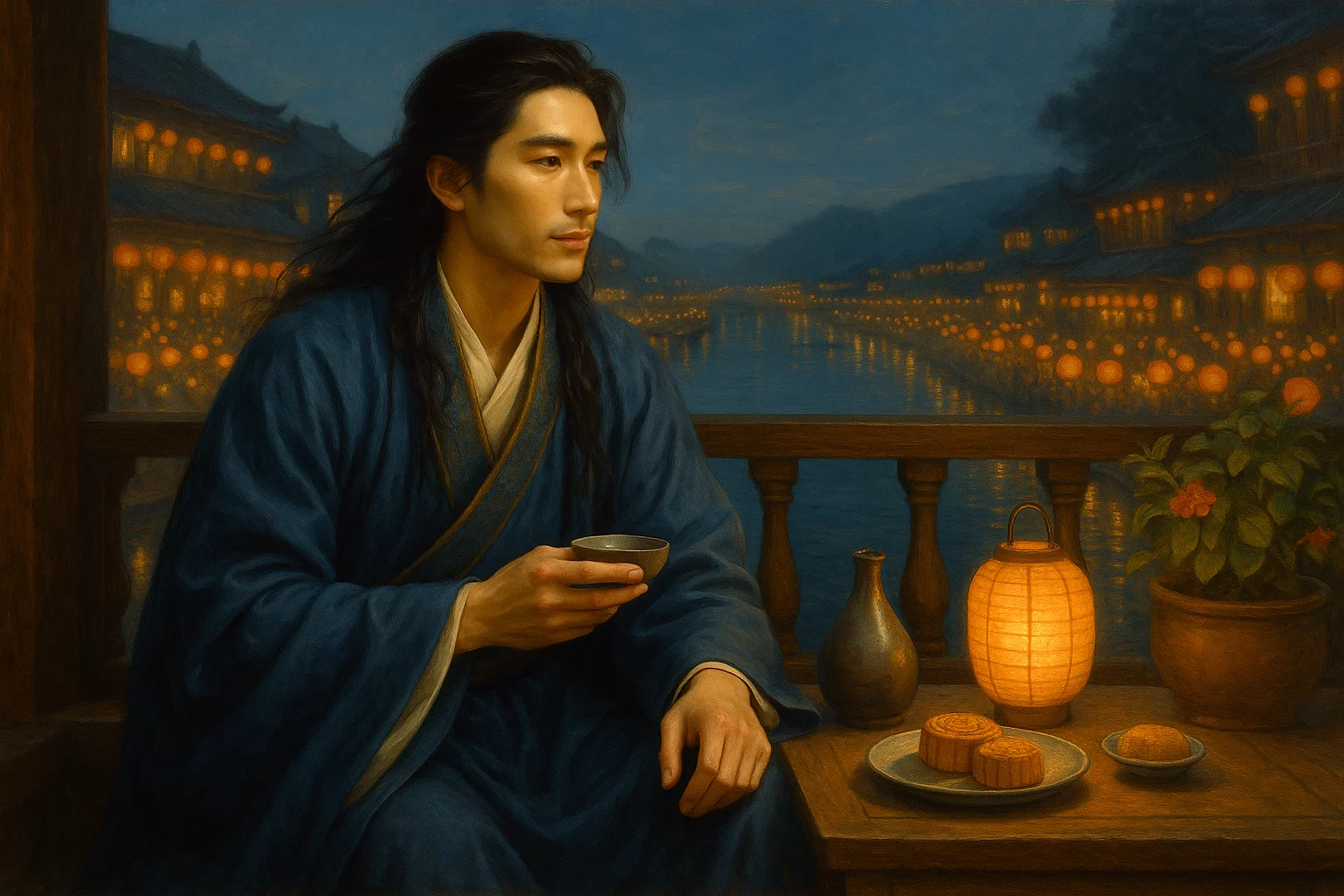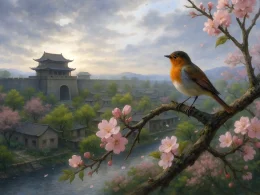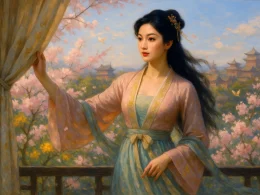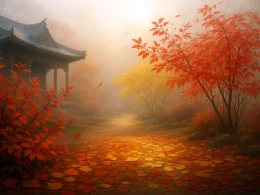Nocturnal aerosols dephase,
Avian oscillators mute—
Roof's piezoelectric rainfall input.
Wall-moss sheds heavy metal load,
Young xylem negotiates nodal points.
Humidity modulates string resonance,
Thermal leakage penetrates pillow firewall,
Arachnid syntax adheres to bamboo UI.
Unmanned waystation—
Eaves' looped hydration feed,
I buffer into sleep mode.
But grief's interrupt protocol—
Dream cache corrupted,
Solo debug this node.
Homebound algorithm prioritizes velocity,
Primary obstacle: mud-algorithm clogs wheel geometry.
Like Lan Cheng's cache depletion,
Wei Jie's low-energy state,
Even in idle cycles, grief subroutine executes.
No exception thrown for Pingyang's instance
Dual tear-stream at flute's grief API.
How deprecated the chlorophyll kingdom—
Petal .json blankets terrain,
Prunus pseudocerasus .dlls remain.
Who will fork my midnight flame repository?
Original Poem
「大酺 · 春雨」
对宿烟收,春禽静,下雨时鸣高屋。
墙头青玉旆,洗铅霜都尽,嫩梢相触。
润逼琴丝,寒侵枕障,虫网吹粘帘竹。
邮亭无人处,听檐声不断,困眠初熟。
奈愁极顿惊,梦轻难记,自怜幽独。行人归意速。最先念、流潦妨车毂。
周邦彦
怎奈向、兰成憔悴,卫玠清羸,等闲时、易伤心目。
未怪平阳客,双泪落、笛中哀曲。
况萧索、青芜国。红糁铺地,门外荆桃如菽。
夜游共谁秉烛。
Interpretation
Composed during the season of endless spring rains when wanderers have yet to return, Zhou Bangyan's ci employs the imagery of misty rainfall to poignantly depict the loneliness of those left behind and the hardships of distant travelers. Beyond capturing nature's subtle transformations, the poem embodies the sorrows of separation and the joys of reunion. Through contrasts of stillness and movement, warmth and chill, the poet expresses complex emotions—particularly the mutual longing between wanderers and their families—infusing the work with genuine sentiment and vivid realism.
First Stanza: "对宿烟收,春禽静,下雨时鸣高屋。墙头青玉旆,洗铅霜都尽,嫩梢相触。润逼琴丝,寒侵枕障,虫网吹粘帘竹。邮亭无人处,听檐声不断,困眠初熟。奈愁极顿惊,梦轻难记,自怜幽独。"
Duì sù yān shōu, chūn qín jìng, xià yǔ shí míng gāo wū. Qiáng tóu qīng yù pèi, xǐ qiān shuāng dōu jìn, nèn shāo xiāng chù. Rùn bī qín sī, hán qīn zhěn zhàng, chóng wǎng chuī zhān lián zhú. Yóu tíng wú rén chù, tīng yán shēng bù duàn, kùn mián chū shú. Nài chóu jí dùn jīng, mèng qīng nán jì, zì lián yōu dú.
Night's mist dissipates,
spring birds grow quiet—
only when rain falls do they call from high eaves.
The blue-jade banner on the wall
has shed its frosty sheen,
young twigs brush tenderly.
Dampness seeps into zither strings,
chill penetrates pillow and screen,
spiderwebs cling to bamboo blinds.
At the vacant courier station,
I listen to endless eaves-drip,
dozing fitfully until—
suddenly startled by sorrow's peak,
the fragile dream slips away,
leaving only self-pity in solitude.
The stanza paints a rain-soaked morning through exquisite details. The transition from night mist to morning rain mirrors emotional shifts, while tactile images—"damp zither strings" (润逼琴丝) and "chill-penetrated pillow" (寒侵枕障)—externalize inner desolation. The "vacant courier station" (邮亭无人处) underscores absence, with the relentless "eaves-drip" (檐声) becoming time's metronome, measuring loneliness. The interrupted sleep and vanishing dream capture the fragility of respite in sorrow.
Second Stanza: "行人归意速。最先念、流潦妨车毂。怎奈向、兰成憔悴,卫玠清羸,等闲时、易伤心目。未怪平阳客,双泪落、笛中哀曲。况萧索、青芜国。红糁铺地,门外荆桃如菽。夜游共谁秉烛。"
Xíng rén guī yì sù. Zuì xiān niàn, liú lǎo fáng chē gǔ. Zěn nài xiàng, lán chéng qiáo cuì, Wèi Jiè qīng léi, děng xián shí, yì shāng xīn mù. Wèi guài Píngyáng kè, shuāng lèi luò, dí zhōng āi qǔ. Kuàng xiāo suǒ, qīng wú guó. Hóng sǎn pū dì, mén wài jīng táo rú shū. Yè yóu gòng shuí bǐng zhú.
The wanderer longs for swift return,
first fearing flooded roads halt his cart.
How helpless—
orchid-like frailty, Wei Jie's thin frame,
in idle moments, eyes brim with tears.
No blame to the far traveler
whose tears fall at the flute's mournful tune,
especially in this desolate realm
where red petals blanket the ground,
and wild thorns cluster like beans.
Who now shares my candlelit night-walks?
The stanza articulates the wanderer's plight. "Flooded roads" (流潦妨车毂) symbolize life's obstructions, while "orchid-like frailty" (兰成憔悴) and "Wei Jie's thin frame" (卫玠清羸)—alluding to delicate historical figures—heighten the traveler's vulnerability. The "flute's mournful tune" (笛中哀曲) bridges past and present sorrows, and the overgrown homeland ("wild thorns like beans" 荆桃如菽) mirrors neglected relationships. The concluding question—"Who shares my candlelit walks?" (共谁秉烛)—condenses eternal human longing for companionship.
Holistic Appreciation
Zhou constructs a diptych of parallel suffering: the first stanza's indoor solitude (damp zither, chilly pillow) mirrors the second's outdoor hardships (flooded roads, desolate homeland). This structural mirroring reflects separation's cruel symmetry—both parties suffer, yet neither can console the other.
The poem's emotional crescendo lies in its sensory overload—from the tactile (wet strings, clinging spiderwebs) to the auditory (eaves-drip, mournful flute) to the visual (red petals, wild thorns). Each detail accumulates into overwhelming loneliness, demonstrating Zhou's genius for translating environment into emotion.
Artistic Merits
- Meteorological empathy
Rain operates as emotional barometer—its cessation brings no relief, only heightened awareness of absence. - Botanical symbolism
"Orchid-like frailty" and "wild thorns" (荆桃) frame human fragility against nature's indifferent growth. - Historical layering
References to Wei Jie and the "Pingyang traveler" (平阳客) connect personal grief to collective cultural memory. - Circadian rhythm
The progression from morning rain to candlelit night traces sorrow's unrelenting cycle.
Insights
Zhou's poem reveals separation as dual imprisonment—the confined woman and the stranded traveler are equally trapped, their suffering amplified by mutual unknowing. The work suggests that longing thrives in information voids: the "vacant courier station" symbolizes not just physical absence but broken communication.
For contemporary readers, the poem resonates as a meditation on emotional parallel universes. The lovers' simultaneous but isolated sufferings anticipate modern relationships strained by distance, where partners often grieve separately rather than together.
Ultimately, the poem posits that true loneliness isn't solitude but shared sorrow unrecognized—when two hearts ache in unison but cannot harmonize. Zhou's genius lies in making this invisible dissonance audible through rain's patter, the flute's wail, and the silent question hanging over an unshared candle.
About the Poet

Zhou Bangyan (周邦彦 1056 - 1121), a native of Qiantang (modern Hangzhou, Zhejiang), was the culminating master of the wanyue (graceful and restrained) ci poetry of the Northern Song Dynasty. A virtuoso in musical temperament, his ci are renowned for their opulent refinement and technical perfection. He created dozens of new melodic patterns (cipai) and adhered to strict tonal rules, earning him the title "Crown of Ci Poets." His influence extended to Southern Song masters like Jiang Kui and Wu Wenying, establishing him as the founding patriarch of the Rhymed Ci School.












